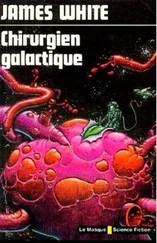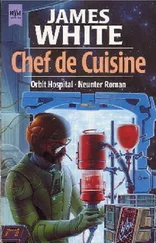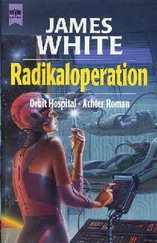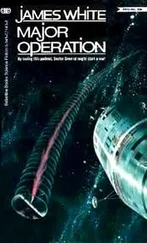He moved his helmet as close to the door as the robot would allow, then closed his eyes and tried to empty his mind of all distractive thoughts and feelings except for the tenuous fog of emotional radiation that he was trying to isolate and identify.
As he had expected from a survivor of a wrecked ship, the strongest emotions were negative. There was fear that was being controlled with difficulty, and a deep, corroding despair and concern that might or might not be personal, and pain. The pain was not the acute form characteristic of trauma, although there as a little of that present, too. It seemed to be more emotional than physical, and associated with a feeling of imminent loss. But within that dark fog there was a pale glimmer of curiosity, and wonder, trying to shine through.
It was time Prilicla shone a little light of his own. Literally Describing aloud what he was doing and thinking, he began switching on and off his helmet spotlight, low enough to be barely perceptible by his own eyes at first, then gradually increasing the intensity. He didn’t want the alien survivor to mistake the light for a weapon, but he also wanted to know if he was being seen through the robot’s eyes or if there were other visual sensors in operation. When he began to detect feelings of physical discomfort that were characteristic of sensory overload, presumably a reaction to a light that was now dazzling it, he reduced the brightness until its feeling of discomfort went away. Next he began flashing his light in an attempt to transmit intelligence in a form that he hoped the other should understand — simple arithmetic.
One flash of light followed two seconds later by another, then two flashes in rapid succession. He repeated the process with three, four, and five flashes as he tried to demonstrate simple addition as well as his own possession of intelligence. A change in the other’s emotional radiation, a sudden feeling of interest, an understanding combining with the background curiosity, told him that he had succeeded.
It was an immediate and present response to his first attempt at communication, but now he needed to know if he could continue the process at long range.
“Friend Fletcher,” he said, “you’ve seen and know what I’ve been doing. I’m going to stop using my helmet light. Instead I want you to duplicate the sequence and timing, but using your ship’s external hull lighting. I won’t be able to see Rhabwar from here, so please tell me as soon as you begin.”
“Right, Doctor,” said the captain. “I’ll need a moment to… You’ve got it.”
He didn’t need the other’s words because the survivor was reacting exactly as it had done to his helmet light, although the curiosity it was radiating was becoming tinged with impatience.
Plainly it was wondering what he was going to do next. That made two of them.
“Thank you, friend Fletcher,” he said. “You can stop signaling now.”
He had expected but was still relieved at the confirmation that the visual communication could be continued from the ambulance ship, either by himself or — if he was undergoing one of his frequent periods of regenerative unconsciousness — by one of the others. But abruptly his relief was obliterated by a sudden explosion of fear from the survivor. Even the movements of its robot had become agitated.
“I’m not doing anything,” he said sharply into his communicator. “What’s happening out there?”
“Nothing much,” the captain replied promptly. “In order to save time loading and off-loading it from the pinnace, Dodds is using his suit thrusters to bring the holo projector to you. It’s an awkward piece of equipment but he can manage; in fact he’s about to land on the hull as we speak. ”
“Dodds,” said Prilicla urgently, “don’t move! The alien survivor is terrified. Turn back until I can find out why.”
But he already knew why. The holo projector was a large, intricate, and completely harmless piece of equipment, but the survivor didn’t know that. While its attention was being directed at Rhabwar’s lights, it had seen Dodds, one of the DBDG lifeforrns which for some reason frightened it, about to land on its ship with what it must have thought was a weapon. Except in the areas where the hull was damaged the ship had external defenses. Terragar had learned that, to its cost. But now it seemed there were no comparable internal defenses.
A porcupine didn’t need spines on the inside.
As well as being sensitive to others’ emotions, Prilicla knew he was a good projective empath. But he also knew that there was no way to make a being who was in the grip of intense fear feel good, or at least a little better, without first removing the source. That was why he concentrated all of his considerable empathic ability into the projection of reassurance, sympathy and trust at a level of intensity that he could not maintain for more than a few minutes. He also gesticulated on the off-chance that the survivor could understand the gestures he was making while he spoke into his communicator.
“I’m pointing back the way I came,” he said, “then making pushing motions with my hands to give the impression that I’m barring entry to anyone else. By now the survivor should have seen friend Dodds turning back. I think it’s working. The fear is diminishing…”
Prilicla continued to emote feelings of reassurance and sympathy until he was forced to stop and rest his brain for a moment, but by then the survivor’s feelings had returned to normal, or at least to the level they had been before the approach of Dodds. But there was still concern in the other’s mind which was not for itself.
The robot followed close behind him as he turned and moved out of the passageway, past the T-junction to the door opposite. It made no attempt tointerfere when he pressed the actuator buttons on the opposite door. As well as being its sole protector, he was beginning to think that it was the only source of vision that the first survivor had.
The door opened into another passageway that was identical in size and layout to the one he had just left, but there the resemblance ended. Only two of the lighting units came on as the door opened so that he had to use his helmet light to see through the transparent access hatches.
“Are you seeing this?” he said again, unnecessarily. “The plumbing and circuitry in this area has sustained damage.”
“We see it, Doctor,” replied the captain, who must have joined Haslam in control. “And there are signs that someone has been trying to effect repairs.”
Two of the pipe junctions had been wrapped in some form of metalized, adhesive tape, but not tightly enough to prevent a rush of air or vaporized fluid from fogging the joints. Behind the hatches he could see that many of the visible cable looms showing patches of heat discoloration, and several had been ruptured. One group, which bore the color-coding indicating that it led from the hull sensors, had been pulled apart, opened and the fine, hair-thin individual strands of wiring fanned outwards in preparation for splicing.
The repair work was nowhere near completion. Prilicla indicated the areas of damage in turn, pointing at the robot each time, then he pointed several times towards the damage and to himself. He was trying to ask two questions— whether the robot was responsible for the attempted repairs, and if Prilicla would be allowed to help complete the work. If the robot or its director understood him, there was no way as yet that they could answer. He moved to the inner door.
It was no surprise that the robot was there first, its body covering the actuator buttons to bar his entrance. But for now he would be content to touch the mind rather than the body on the other side of the door.
The general emotional texture was the same as he had detected from the other survivor, but the content was shockingly different. This time there was physical as well as emotional trauma. He couldn’t even guess at what was causing the physical discomfort, but there was a feeling of constriction, possibly of suffocation, that was overlaid by fear, despair, and the dreadful, negative emotion characteristic of utter isolation. He edged a little closer to the door and, as he had done earlier, concentrated on rejecting reassurance, friendship, and sympathy.
Читать дальше












